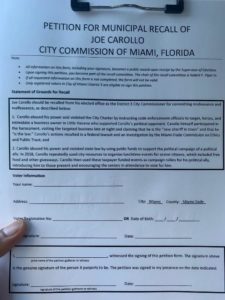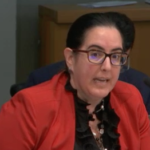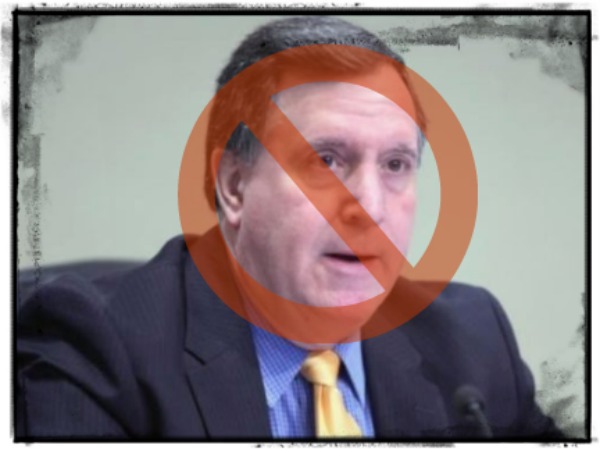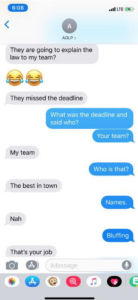UPDATED: The recall effort against Miami Commissioner Joe Carollo may be headed to court after the city held the petitions hostage for a day — purportedly to review them — and then announced in the afternoon that they were submitted too late.
So why review them? Both City Clerk Todd Hannon and City Attorney Victoria Mendez knew when the petitions were submitted, without having to go through every one of the 1,914 petitions signed by District 3 voters desperate to get Carollo out.  So, what were they reviewing them for?
So, what were they reviewing them for?
According to Suzy Trutie, a spokeswoman for the Miami-Dade Elections Department, they were expecting the petitions sometime Monday at the county office in Doral.
“The City of Miami Clerk’s Office called the Elections Department around 9:20 a.m. this morning to advise they received over 1,900 petitions, would be reviewing them and delivering them to the Elections Department once their review was completed,” Trutie told Ladra in an email.
Read related: Miami Commissioner Joe Carollo recall signatures submitted for Round 1
By 4:10 p.m., Hannon had another story for JC Planas, the attorney for the Take Back Our City political action committee that collected the signatures.
“This letter is to acknowledge that my office is in receipt of the recall petition on behalf of Take Back Our City, which was filed today, March 2, 2020. I am writing to inform you that it is the City‘s position that the petition, which reflects that signatures were first collected on January 31, 2020, is untimely.
Although you sent me an e–mail communication on February 29, 2020, attempting to submit the petition, there is no
provision in Section 100.361, Florida Statutes, for the electronic submission of recall petitions. Further, your e–mail communication would also have been insufficient under Section 100.361, Florida Statutes, because the section requires that “[t]he person designated as the chair of the committee shall file the signed petition,” and contains no provision for delegating that obligation.
Finally, although the last day for filing of the petition fell on Sunday, March 1, 2020, there is no indication in Section 100.361, Florida Statutes, that individual(s) filing such petitions are permitted to file their petition on the next regular business day, in situations where the deadline falls on weekends or holidays.
As such, the petition will not be submitted to the supervisor of elections for any further processing. You may stop by to retrieve the petition, at your convenience.
Thank you,
Todd Hannon City Clerk
How did Hannon not know the deadline had passed at 9:20 a.m. Monday when he told the county elections department that the petitions were coming to them later that day?
And wasn’t the PAC told the deadline was Saturday and not Sunday, March 1? Ladra was told Hannon was waiting at City Hall until 8 p.m. Saturday, not Sunday. So why does his letter say Sunday? Is it a fluid deadline?
Read related: Three Amigos cry about ‘outsiders’ in recall, but take lots of outside money
Also, there is no provision or indication in Section 100.361 of the Florida Statutes that provides for the city clerk or attorney to review the petitions. It does, however, say that the signatures have to be turned over to the county “immediately,” which is why the hard copies were kept until Monday morning and a drop box with the scanned images was sent before midnight Saturday.
Word for word:
- “Immediately after the filing of the petition forms, the clerk shall submit such forms to the county supervisor of elections. No more than 30 days after the date on which all petition forms are submitted to the supervisor by the clerk, the supervisor shall promptly verify the signatures in accordance with s. 99.097, and determine whether the requisite number of valid signatures has been obtained for the petition. The committee seeking verification of the signatures shall pay in advance to the supervisor the sum of 10 cents for each signature checked or the actual cost of checking such signatures, whichever is less.
- Upon filing with the clerk, the petition and all subsequent papers or forms required or permitted to be filed with the clerk in connection with this section must, upon request, be made available in alternative formats by the clerk.
- If the supervisor determines that the petition does not contain the requisite number of verified and valid signatures, the clerk shall, upon receipt of such written determination, so certify to the governing body of the municipality or charter county and file the petition without taking further action, and the matter shall be at an end. No additional names may be added to the petition, and the petition shall not be used in any other proceeding.
The immediate transfer never happened. The county is the one that is supposed to validate the signatures — or not. The city only has to present the criteria, which would be valid voters of District 3. The county would have still filed the petitions, as stated in the law, “without taking further action.” That never happened. The county would have charged the PAC to do this. The city spent countless staff hours copying and scanning documents they had no presumed right to copy, according to the statute, at taxpayer expense, for no reason.
of District 3. The county would have still filed the petitions, as stated in the law, “without taking further action.” That never happened. The county would have charged the PAC to do this. The city spent countless staff hours copying and scanning documents they had no presumed right to copy, according to the statute, at taxpayer expense, for no reason.
Or for a nefarious reason.
A source told Ladra that the city attorney had staff scan all the copies and “OCRed them,” referring to “optical character recognition” software technology that can distinguish text characters in handwritten and typed document images, like scanned petitions, and then there is a “soft copy” that users can edit, format, and search as if it was created in Word.
So, basically, they have a searchable database now of all the 1,914 voters who signed petitions. What on Earth for?
Intimidation. That’s the only thing Ladra can think of. So that Carollo and his henchmen can go to those addresses and either (1) get voters to rescind them by threatening to take away their public housing and/or send code enforcement after them or (2) “warn” voters not to sign a second round — when petitioners have to collect about 5,000 signatures — with the same threats.
There is no other reason for the city attorney to keep a database of the petition signers. I’m not even sure that’s legal.
Why wouldn’t they just hand the clear plastic box back to JC Planas, the attorney for the Take Back Our City political action committee, and tell him it was too late? They presumably already knew it. Remember, Commissioner Alex Diaz de la Portilla texted Ladra at  7:42 p.m. on Sunday. “As I expected, the malcontents fell short. Now we can move on and do the people’s work,” the Dean wrote.
7:42 p.m. on Sunday. “As I expected, the malcontents fell short. Now we can move on and do the people’s work,” the Dean wrote.
How did he know? Who told him?
But that’s not all he texted. He was on a roll.
“A clown car of malcontents y envidiosos… We have been laughing since yesterday. They missed the deadline.” Diaz de la Portilla included two “laughing in tears” emojis — for effect.
Read related: More Miami power plays prove ADLP is the new boss, runs the show
We have been laughing since yesterday? And who is “we?” Ladra asked him who decided the petitions missed the deadline.
Names?
“Nah. That’s your job.”
So, Commissioner Diaz de la Portilla’s “team” also reviewed the petitions that were supposed to be sealed before they were turned over to the county? Does this not stink of political intervention? You know, like the kind they have in Cuba and Venezuela?
And, more importantly, they knew since Sunday — no, wait, since they were laughing about it on Saturday — that the petitions were going to be rejected because of the city’s interpretation of the deadline. How could they be laughing about that on Saturday when the petitions were allegedly due on Saturday? No, wait, according to Hannon’s email they were due Sunday.
And then, again, why review and copy them if they are, indeed, invalid?
This goes to show that the city attorney — because Ladra believes Mendez interfered between Hannon’s first contact with the county and his email to Planas seven hours later to give him the legal mumbo jumbo arguments — was always going to find a reason to reject the petitions (probably as she has been instructed to) and that Planas was always going to have to file a legal challenge so that 1,914 voters aren’t disenfranchised.
Planas said Monday afternoon that he was preparing a lawsuit. They should have been ready for it. They should file Tuesday.
Also, Mendez — who is desperately trying to  hang on until she is vested — should be investigated. She represents the people who pay her salary. Not Commissioner Joe Carollo. Not against the residents of the city. The argument about the timeliness — any argument about the validity of the recall petitions — should have been made by Ben Keuhne, Carollo’s private attorney, and only after the county review. The city could have filed an amicus brief in support, maybe, but it is not the city attorney’s purview to reject a recall petition for one of her bosses. Furthermore, if she know that it’s going to be invalidated because she was certain her interpretation of the law was correct, why not just send it to the county and let them do it and no one can call her a political lackey?
hang on until she is vested — should be investigated. She represents the people who pay her salary. Not Commissioner Joe Carollo. Not against the residents of the city. The argument about the timeliness — any argument about the validity of the recall petitions — should have been made by Ben Keuhne, Carollo’s private attorney, and only after the county review. The city could have filed an amicus brief in support, maybe, but it is not the city attorney’s purview to reject a recall petition for one of her bosses. Furthermore, if she know that it’s going to be invalidated because she was certain her interpretation of the law was correct, why not just send it to the county and let them do it and no one can call her a political lackey?
This more than anything else shows why Carollo needs to be recalled — and Diaz de la Portilla needs to be questioned by the authorities about what he knew, when he knew and how he knew it.
Late Monday, activist attorney David Winker — who has battled with the city on a number of issues — sent a letter to both Hannon and Mendez citing case law and precedents that showed courts favored Mondays as the deadline day when numerically a deadline falls on a Sunday. And asking them to voluntarily reconsider their earlier decision.
The letter “points out a glaring misstatement of law in Todd’s letter rejecting the recall petitions submitted today. Failure to correct this immediately will demonstrate the bad faith of your respective offices because Florida law could not be clearer on this subject.
“It is well settled in Florida that where a statute is silent as to the computation of a deadline but simply lists a deadline in days, as does the recall statute, it is presumed that a statutory deadline will not expire on a weekend or legal holiday. See Fla. Jur. Time § 20 (“the general rule is that, if the last day that an act must be performed falls on a Saturday, Sunday or holiday, the prescribed period runs until the end of the next day that is not a Saturday, Sunday or holiday. This rule is applied where a governing statute is silent on the time computation issue….”); citing Stockslager v. Daly Aluminum Products, Inc., 246 So. 2d 97 (Fla. 1971).
In Stockslager, the Florida Supreme Court set forth the law on this subject that has held since it was issued in 1971. In that case, the Supreme Court was reviewing a lower court decision about the Mechanic’s Lien Law that provided for a 45 day notice period. The issue was that the last day, the forty-fifth day as prescribed in the statute, fell on Sunday. The court held that the receipt of notice was timely since it was received on the forty-sixth day, the forty-fifth day being on Sunday.
The Court cited In Dade County Planning Department v. Ransing, 158 So. 2d 528, (Fla. 1963), an earlier case involving timeliness of an application for review filed on the 21st day after the entry of the order of the Deputy, where the 20th day fell on a Sunday. The court held that common sense demanded that the appeal was timely filed on Monday, the 21st day.
The Supreme Court in Stockslager stated that “To our statement in that case only one comment need be added: the rule established therein has the additional benefit of recognizing the impossibility of performing most procedural acts set up by statute on a Sunday or holiday. Accordingly, absent a clear statutory mandate dictating a different result, we decline to ascribe to the Legislature an intent to require a party to perform an impossible act.”
Todd Hannon’s letter states that “the last day for filing of the petition fell on Sunday, March 1, 2020.” The City of Miami Clerk’s office is not open on Sunday and it was therefore impossible to submit the filings.
This conclusion is reiterated in Fla. R. Jud. Admin. sec. 2.514 Computing and Extending Time:
(a) Computing Time. The following rules apply in computing time periods specified in any rule of procedure, local rule, court order, or statute that does not specify a method of computing time.
(1) Period Stated in Days or a Longer Unit. When the period is stated in days or a longer unit of time
(A) exclude the day of the event that triggers the period;
(B) count every day, including intermediate Saturdays,
Sundays, and legal holidays; and
(C) include the last day of the period, but if the last day is a Saturday, Sunday, or legal holiday, or falls within any period of time extended through an order of the chief justice under Florida Rule of Judicial Administration 2.205(a)(2)(B)(iv), the period continues to run until the end of the next day that is not a Saturday, Sunday, or legal holiday and does not fall within any period of time extended through an order of the chief justice. (emphasis added).As such, there is absolutely no legal support for the conclusion reached in Mr. Hannon’s letter.
Now what are they going to say? Watch them pull a completely different strategy. Hope Winker and Planas are prepared.


